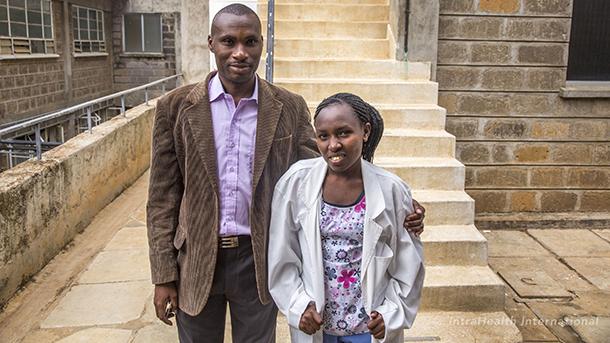Where We Work
See our interactive map


A series of radio spots aired on Ethiopia’s National Service of Radio Fana encouraged men to help keep their families healthy. These spots were developed by the USAID-funded Community PMTCT Project to promote male involvement in maternal, newborn, and child health (MNCH) services, including the prevention of mother-to-child transmission of HIV (PMTCT). The radio spots encourage men to seek out HIV testing and counseling for themselves and their partners, accompany their partners to health facilities for MNCH/PMTCT services, take their partners to nearby health facilities for delivery, and support their partners in breast feeding.
In many parts of Ethiopia, especially rural areas, women traditionally give birth at home, where PMTCT services are not available. Men typically do not accompany women to reproductive health care services. By encouraging men to get involved with their partners’ reproductive health care, the project aims to reduce the number of babies born with HIV and improve the health of the entire family.
The radio scripts include supporting commentary from health care and religious authorities. Originally aired in Amharic, the following is a translation of one of the radio spots, written by Dr. Daniel Kinde, from the John Hopkins International/Technical Support for the Ethiopian HIV/AIDS ART Initiative.
The setting: a health facility
The participants:
Kebede: (after salutation) What brought you here? Are you both alright?
Alemu: We are both alright. We just came out of the ANC clinic.
Kebede: Who is pregnant? Do they tell you to have a follow up for your “fat accumulation in the abdomen’’?
Alemu: You always make fun of something. I just came here after the invitation from the health professional following Aleme’s pregnancy.
Kebede: The health professional invited you to a female clinic! What for?
Alemu: It was initially odd for me too and I wouldn’t have come if Alemitu had not urged me! However I benefited a lot. We know our HIV status. What a relief! I learned what makes my sweetheart and baby healthy, the relevance of health facility delivery, what to do in preparation for labor and delivery, the importance of exclusive breastfeeding for the first six months, and a lot more. What the doctor said really struck me! He said, “What is wrong with making few visits and spending some time at a women’s clinic for the sake of the baby who is to be named after the father?”
Alemitu: I’m really proud of my husband!
Kebede: I remember of a time when my wife, Aynalem, asked me to go to her ANC clinic and I resisted since I thought it is worthless. Now I understand it really makes sense. I have to, of course, contribute my share.
Religious leader: Good morning! I’ve been listening to all of you and I am happy. The creator bless you all. Our religion also teaches and stresses men’s role in the well being of the family. Men need to support their spouses in all maternal and child health issues.
All: Thank you, our father!
Alemu: We need to hurry. We have to buy the medicine before the pharmacy closes for lunch.
All exchange farewells.
Announcer: Men have an immense role in PMTCT and maternal and child health! If you want additional information, please visit the nearby health facility.
The Community PMTCT Project aims to increase the number of women in Ethiopia using PMTCT services, as well as the number of HIV-positive clients in the community who are monitored and cared for by community health workers. The project’s partners include Pathfinder International, Program for Appropriate Technology in Health, and International Orthodox Christian Charities, as well as the Government of Ethiopia and Ethiopia’s Federal Ministry of Health, HIV/AIDS Prevention and Control Office, Regional Health Bureaus, Zonal and Woreda Health Offices, health centers and health care providers, and local organizations and communities.



